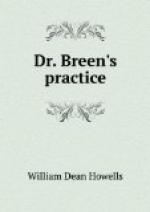Until the present time she and Grace had not seen each other since they were at school together in Southington, where the girl used to hear so much to the disadvantage of her native section that she would hardly have owned to it if her accent had not found her out. It would have been pleasanter to befriend another person, but the little Westerner suffered a veritable persecution, and that was enough to make Grace her friend. Shortly after she returned home from school she married, in that casual and tentative fashion in which so many marriages seem made. Grace had heard of her as travelling in Europe with her husband, from whom she was now separated. She reported that he had known Mr. Libby in his bachelor days, and that Mr. Libby had travelled with them. Mr. Maynard appeared to have left to Mr. Libby the arrangement of his wife’s pleasures, the supervision of her shopping, and the direction of their common journeys and sojourns; and it seemed to have been indifferent to him whether his friend was smoking and telling stories with him, or going with his wife to the opera, or upon such excursions as he had no taste for. She gave the details of the triangular intimacy with a frank unconsciousness; and after nine o’clock she returned from a moonlight walk on the beach with Mr. Libby.
Grace sat waiting for her at the little one’s bedside, for Bella had been afraid to go to sleep alone.
“How good you are!” cried Louise, in a grateful under-tone, as she came in. She kissed Grace, and choked down a cough with her hand over her mouth.
“Louise,” said Grace sternly, “this is shameful! You forget that you are married, and ill, too.”
“Oh, I’m ever so much better, to-night. The air’s just as dry! And you needn’t mind Mr. Libby. He’s such an old friend! Besides, I’m sure to gain the case.”
“No matter. Even as a divorced woman, you oughtn’t to go on in this way.”
“Well, I would n’t, with every one. But it’s quite different with Mr. Libby. And, besides, I have to keep my mind from preying on itself somehow.”
II.
Mrs. Maynard sat in the sun on the seaward-looking piazza of the hotel, and coughed in the warm air. She told the ladies, as they came out from breakfast, that she was ever so much better generally, but that she seemed to have more of that tickling in her throat. Each of them advised her for good, and suggested this specific and that; and they all asked her what Miss Breen was doing for her cough. Mrs. Maynard replied, between the paroxysms, that she did not know: it was some kind of powders. Then they said they would think she would want to try something active; even those among them who were homoeopathists insinuated a fine distrust of a physician of their own sex. “Oh, it’s nothing serious,” Mrs. Maynard explained. “It’s just bronchial. The air will do me more good than anything. I’m keeping out in it all I can.”




